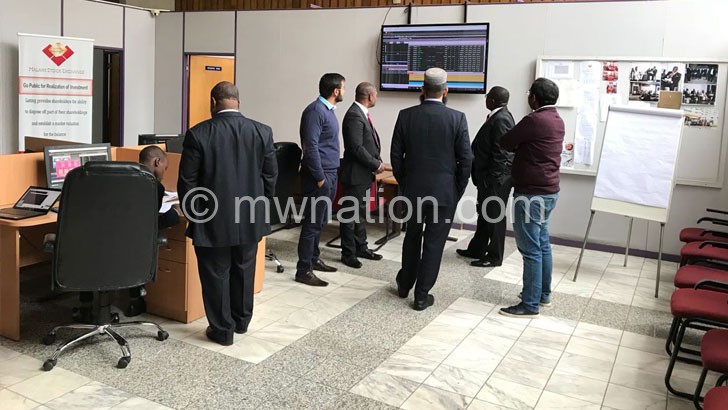Malawi Stock Exchange (MSE) firms performed poorly in the first half (H1) of this year dampened by the current subdued economic environment characterised by high inflation and a depreciating kwacha, local market watchers have said.
The 16-counter MSE market performance analysis contained in the Mid-Year Nico Asset Managers Report shows that 10 out of the 16 counters had share price losses when compared to the first six months of last year.
Stockbrokers and market analysts observe trading on the bourse
The figures show share price losses on Blantyre Hotels Limited, FDH Bank plc, Icon Properties, Mpico Limited plc, NBS Bank plc, Nico Holdings plc, Old Mutual plc, Press Corporation plc, Sunbird Tourism plc and TNM plc by 0.01 percent, 11.51 percent, 6.9 percent, 0.01 percent, 0.57 percent, 15 percent, 23.81 percent, 0.01 percent, 11.11 percent and 38.92 percent, in that order by June 2022.
But on the other hand, dividend yield for June 2022 marginally increased to 3.97 percent from 3.25 percent in December 2021 and 3.59 in June 2021.
Such a decline in capital gains, according to market analyst Bond Mtembezeka, mirrors the current economic status, which had a knock-on effect on the market, which like any other free market, is subjected to market forces of demand and supply.
He said: “When demand is in excess relative to supply, stock prices increase and the converse holds. Looking at what has been happening over the last half year, economic fundamentals have shifted in a way that has compelled people to dispose of their positions.
“Rising non-food and food inflation and the depreciation of the kwacha have compelled people to liquidate their shares on the market, thereby flooding the market relative to demand.
“Some people even accept discounted prices, thus, dampening the performance sending prices tumbling.”
Mtembekeza said the outlook does not look good as economic agents’ purchasing power is relatively low owing to rising inflation and subdued economic activity.
He said there would not be enough surplus funds for investment.
In a separate interview, Stockbrokers Malawi Limited chief executive officer Noel Kadzakumanja acknowledged the decline in value for some firms on the market, but said the outlook gives hope that the market will close the year with better performance.
He said: “Despite the decline in values and volumes traded in the six months, the overall measure of the stock market points to a better performance compared to last year. While a good number of companies have registered decline in share price, the price gains made by a few counters have been enough to offset the price losses on the rest of the counters.”
MSE operations manager Kelline Kanyangala said in an interview on Tuesday that the market performed relatively well, but the volumes and traded value have registered a decline compared to a similar period last year.
She said: “There have been quite a few developments within the macroeconomic environment which have heightened uncertainties of the economic outlook.
“It is not unusual in such circumstances for investors to take a wait-and-see approach so that they can make better informed decisions. This could potentially be what we are seeing with the reduced activity on the market.”
Kanyangala said rising inflation has also eroded the disposable income of investors as such many would not be able to participate as actively on the market.
Over the past few months, major macroeconomic variables that have traditionally impacted the local shares market such as inflation and currency movements, have been rising and depreciating respectively.
Inflation has been on the rise for the past months, largely on account of rising commodity prices, especially food prices.
For instance, in a space of seven months, the inflation rate has doubled from 12.1 percent in January to 24.6 percent as of July, according to the National Statistical Office figures.
On the other hand, the kwacha has dropped to the current K1 036 to the dollar from K825 following the 25 percent devaluation efffected on May 27 this year.
Minority Shareholders Association of Malawi secretary general Frank Harawa said the falling share prices are eroding gains by investors, hoping that the macroeconomic environment will improve.
The post Subdued economy sinks stock market appeared first on The Nation Online.
 Moni Malawi
Moni Malawi 

